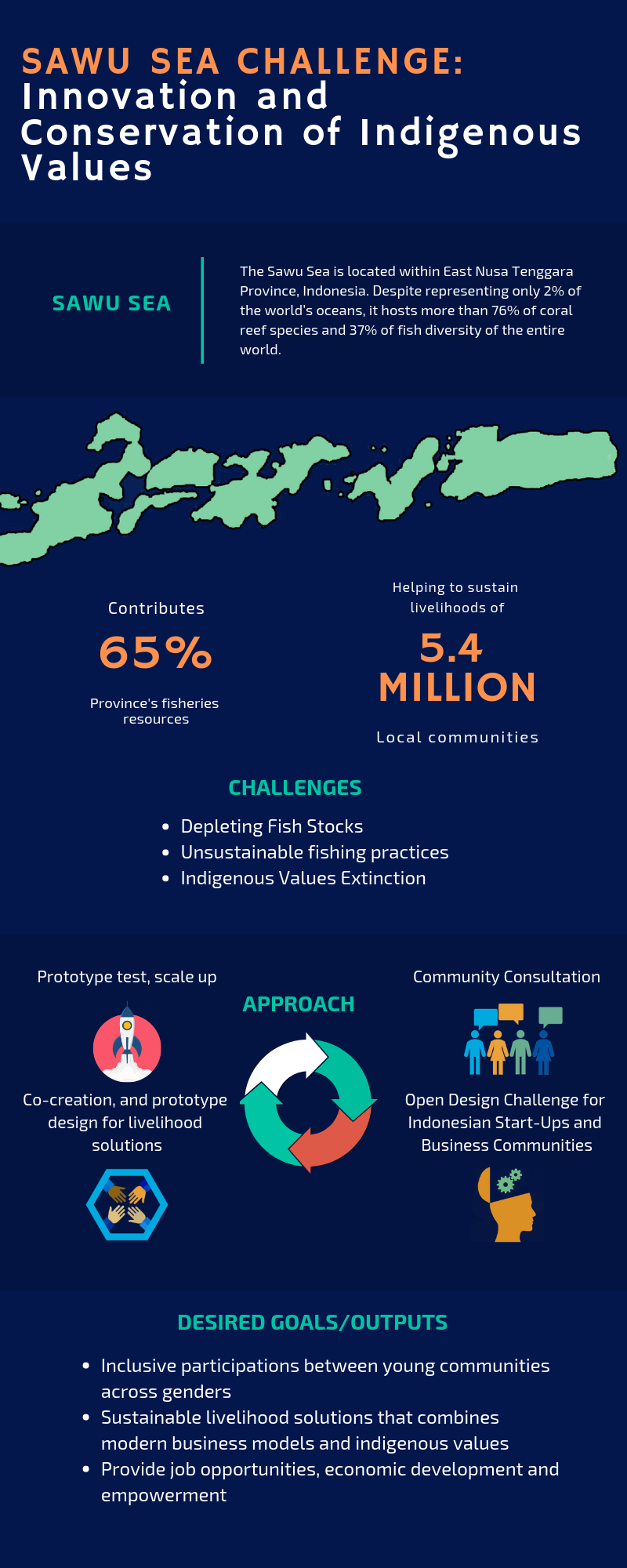
Savu Sea Challenge: Innovation and Conservation of Indigenous Values


Savu Sea Challenge: Innovation and Conservation of Indigenous Values
A. Challenge
The Sawu Sea is located within East Nusa Tenggara Province and included as the Exclusive Economic Zones. Despite representing only 2% of the world’s oceans, it hosts more than 76% of coral reef species and 37% of fish diversity of the entire world. The Savu Sea alone contributes for more than 65% of the province’s fisheries resources, which has become the source of income for more than 5.4 million people. Despite its importance, illegal and unsustainable fishing practices still occur within daily lives of the fisher communities. Bomb fishing, massive and unsustainable fishing gears or targeting endangered and vulnerable marine animals have been threatening the food security over years. Due to its dispersed and remoteness, the communities around Savu Sea often missed from any livelihood improvement programs. A small number of traditional businesses such as crafting, alternative fish products, etc. are present but with market limitation, low capacity and lack of business inheritance failing to support the economic improvement.
B. Methodology
The Sawu Sea Challenge is a design challenge which will address the livelihood problems within Sawu Sea Region. The challenge will focus on creating a platform where national start-ups of businesses and technologies can co-create with local indigenous communities. The idea is to combine past-and-current indigenous practices with creative business models or technology which are motored by young people across Indonesia's regions. Sawu Sea Challenge will create the outputs of prototypes of circular business models or best practices which will be developed at the local scale with aim to achieve sustainable livelihood solutions that improve well-being, creation of job opportunities and conserving indigenous cultures of remote communities.
C. Desired Impact
The Sawu Sea Challenge will target the indigenous communities in remote villages of Savu Sea. Using the human-centered design, we’ll incorporate community’s approval, ideas and collaboration throughout the phase. With a goal to find alternative livelihood solutions, we hope to dig the indigenous values that almost extinct within the communities; while at the same time, rejuvenate the young people’s interests to continue the indigenous practices through job creations. Sawu Sea Challenge at the same time will diminish the barrier between “modern” and “ancient” paradigm in Indonesia. Through involving broad young Indonesian practitioners, we hope to grow compassion and mutual understanding for both Indonesia’s modern societies and local remote communities. At the long-term, we hope to shift the illegal fishing practices which threatening their food security by providing sustainable income without removing the local wisdom and values within the communities.
D. Beneficiaries
Sawu Sea Challenge will invite different community groups which focus on three main livelihood challenges in Savu Sea (fisheries, local handicrafts, and agriculture). Because the groups mainly operating with ageing community members, we will take them as part of the current experts-to brainstorm the opportunities, challenges and limitations of livelihood practices which has been running over years. Mainly, the targets are younger community members (age 15-30) with minimum 30 people in the communities. Preferably those that still related to the current business owners, school drop-outs or university graduates who found hardship in finding job opportunities. The young community members will be selected gender-balanced for the inclusive participations. Meanwhile, the challenge will be open nationally across Indonesia’ archipelago and target Indonesia’s young practitioners which focus on business, technology or start-ups of age 18-30.
E. Ideas Implementation
The Sawu Sea Challenges will be implemented in four phases over one year period of implementation.
This phase will includes obtaining the necessary licensing and permits from provincial, regency and village level of governments. Conduct field visits at village targets at Rote, Alor and East Flores, conduct in-depth interviews and discussion with community members and planning for the consultation. The project consultation will focus on gathering older community members who have run the business over decades--obtaining their perspectives on fisheries, agriculture and local handicrafts. Information of livelihood challenges and opportunities will be collated. The information then will be communicated to younger groups, selecting the enthusiastic and committed young people as design challenge and incubator counterparts.
The design challenge process will include the creation of website and contents, branding, outreach performance evaluation, coordinating potential mentors for incubator, and communicating all potential ideas to community groups in each respective village. The final of this phase would be obtaining the communal agreement from indigenous communities for potential ideas for further development. The shortlisted candidates which represent each livelihood challenges will be invited for field visits, discussion and grouping to strengthen their foundation for incubator week
Shortlisted candidates will be invited to attend the incubator week for five days and get to collaborate with youth community members. Incubator week will be a series of workshop which invites different experts of start-ups in fisheries, technology, agriculture and creative industries. Selected ideas will be refined during the workshop with inputs from facilitators and experts; to develop a more-concrete prototype plan. At the end of the incubator week, each group will present their prototype design in front of expert juries, the best three to five ideas (winners) in respect to livelihood challenges will receive the opportunity of prototype testing in the course of two months.
Evaluation phase will be conducted on two terms; prototype testing performance and livelihood improvement. Prototype testing performance will be evaluated through the focus group discussion of the team members and experts. The potential of continuity, livelihood impacts and community’s decision upon the prototype adoption will be evaluated through the in-depth discussion and meetings.
F. Conclusion
The Sawu Sea Challenge will be the prototypes of businesses or best practices within the communities. Livelihood challenges within the Indonesian coastal communities are the greatest issue to solve. The problems of livelihood itself mainly due to the ineffective approach and the exclusiveness. Our prototypes will be the first that combine indigenous values, modern business model that motored by young people which achieved through communal consensus at the small-scale.